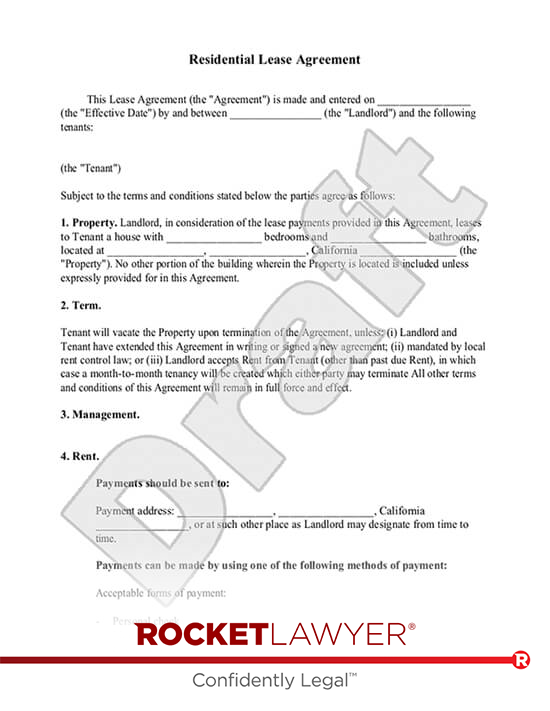Are electronic signatures valid across state lines?
Electronic signatures are generally valid within a state and across state lines under both state and federal laws. Federal and international laws also apply to electronic signatures abroad, although a handful of countries still have not approved them for use. Be sure to do some research, or ask a lawyer about any specific requirements you may be required to follow. Be aware, however, that a new college student who is still a minor may not have the legal capacity to enter into a Lease Agreement and you may want to require a co-signer. You may also want to require a co-signer for tenants that do not have an established credit history as well.
One concern with any signature is verifying the identity of the person signing to ensure the validity of the signature. RocketSign® makes it easy for property managers, tenants, and co-signers to exchange documents and secure valid signatures for leases and a whole host of landlord and tenant agreements, quickly and easily.
How can property managers help during the fall move-in rush?
When multiple tenants may be moving in on the same day or during the same week or few days, which is often the case for multi unit properties on college campuses, a property manager can be indispensable to a landlord.
When handing over the keys, particularly to younger tenants, documenting the condition of the property may save a lot of stress when move-out time comes around. A property manager can help during move-in by:
- Inspecting the individual units with the tenants present. During the inspection, a property manager can take pictures, and fill out a move-in inspection form that records any existing damage or wear so it is clear what damage or wear is caused by the tenant.
- Handling building security issues. Often when tenants are moving-in or out, doors to common areas may be left open, which can pose a security risk. Having an onsite property manager present on moving days can lower the risk of a security incident.
- Answering tenant questions or demonstrating how certain fixtures or appliances work. This can help avoid damage caused by misuse.
- Showing tenants how to use safety equipment, or where it is located.
- Providing tenants with a list of phone numbers in case of an emergency.
What if a renter never shows up?
In most cases, a Lease Agreement is legally binding when signed even if the renter never moves in. You may already have the first and last month's rent, and a security deposit, in the bank before the move-in date. Generally, the renter is liable for rent subject to the terms of the rental agreement, the landlord's duty to mitigate damages or avoid losses, or other state or local limits.
As a practical matter, you may want to get in touch with the renter as soon as possible to see if they intend to move in. If not, it is best to get it in writing that they are canceling their lease so you can quickly re-rent the property. Keep in mind that even if state or local law makes the tenant liable for the entire lease, collecting more than one month's rent may be complicated and require legal action. If you intend to charge the tenant, you may want to ask them to agree to the amount you plan to withhold from their deposit when they give their notice to cancel.
Can you charge a cleaning fee to new tenants?
Landlords can generally charge any move-in or move-out fees as long as they are part of the application process or in the lease. Some state or local laws, however, may impose limits on the types or amounts of fees. It can often be beneficial to include the cost of cleaning a unit between tenants when you are crunching the numbers to decide on your rental price. For example, if it will cost $500 to clean the unit between renters, increasing your monthly rent by $45 per month can cover that cost for tenants that stay a year or longer.
If you do charge for a cleaning service separately, or plan to deduct cleaning fees from a security deposit, you may want to make sure this is clear to your tenants from the outset. You may also want to ask a lawyer about state or local limits on these types of charges.
Can you demand a higher security deposit for more wear and tear due to remote learning and telecommuting?
State and local laws may set a general limit on security deposits. Often security deposits are limited to one or two months of rent. Market considerations may also limit what you can charge, especially when renting to college students.
Even if you ask for a larger security deposit, you still have the burden of proving that the tenant caused more than reasonable wear and tear to the property. This may require showing something like carpet damage caused by an office chair used without a floor mat to protect the carpet. A security deposit cannot be used for routine maintenance and refurbishment between rentals. Using a detailed Move-Out Inspection Checklist can help you support potential claims.
If you have more questions about renting to students or young adults, reach out to a Rocket Lawyer network attorney for affordable legal advice.
This article contains general legal information and does not contain legal advice. Rocket Lawyer is not a law firm or a substitute for an attorney or law firm. The law is complex and changes often. For legal advice, please ask a lawyer.
